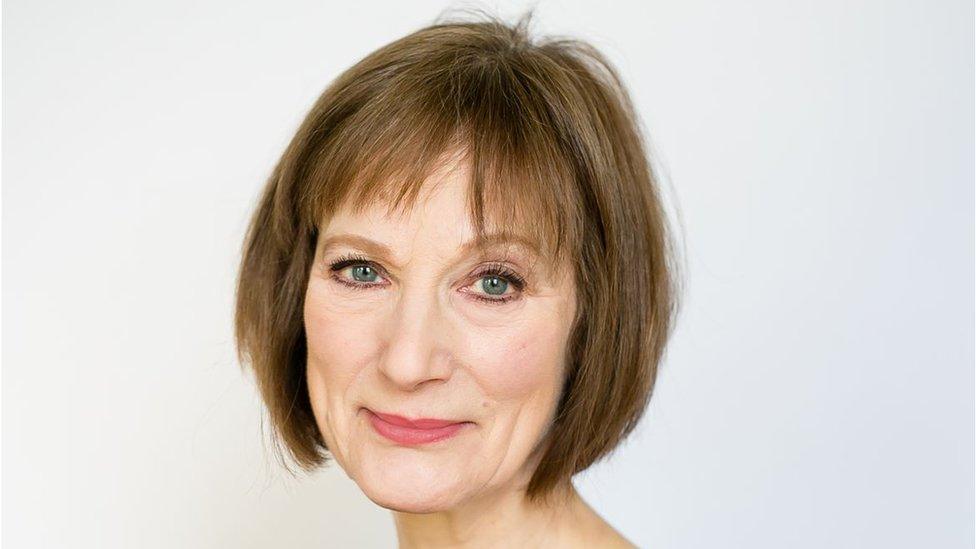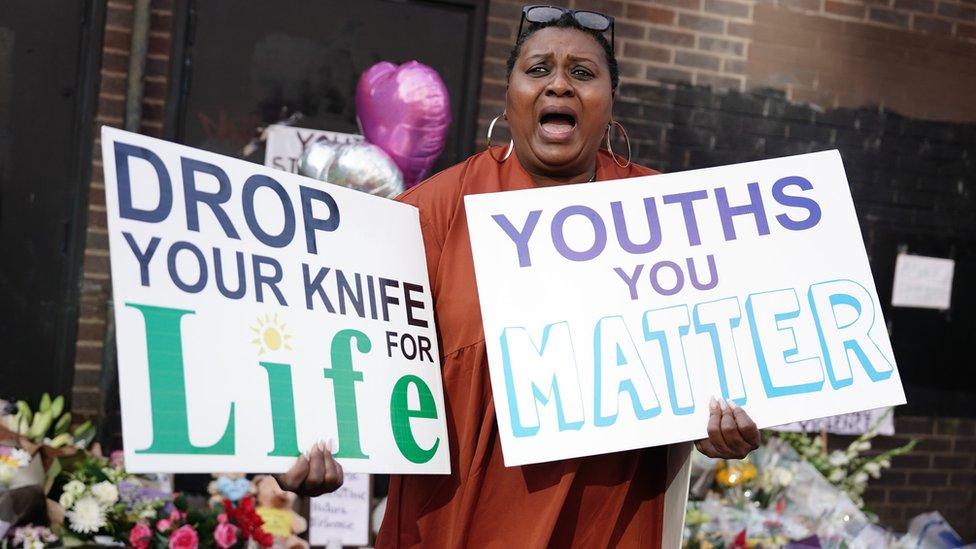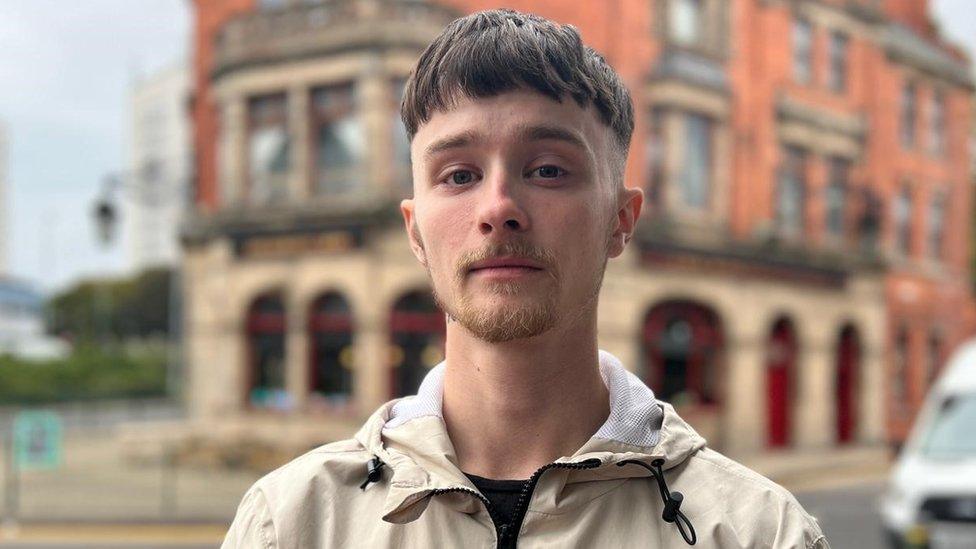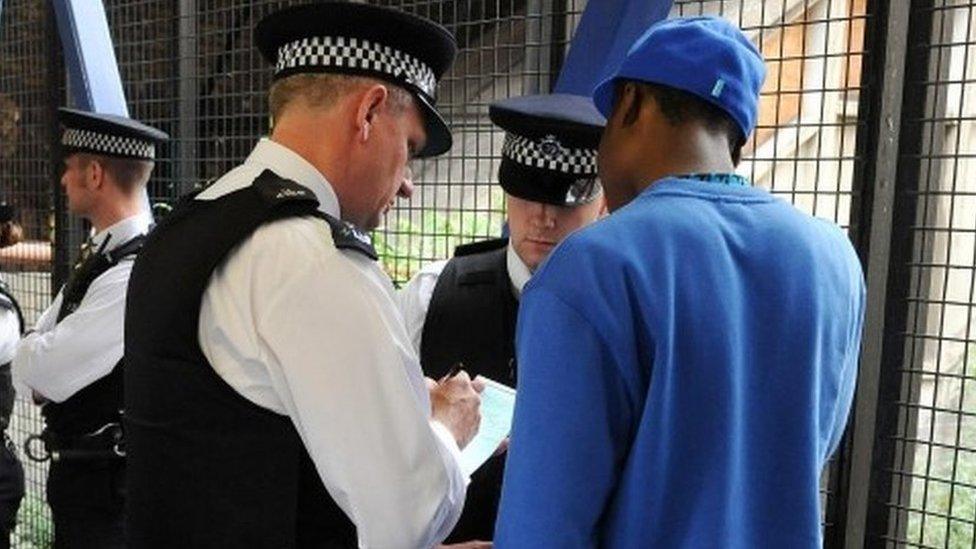'I have seen hundreds of knife-killers in court'
- Published

Wendy Joseph spent a decade as a Senior Circuit Judge at the Old Bailey
During her extensive career as an Old Bailey judge and criminal law barrister, Wendy Joseph KC has seen hundreds of killers who ended their victim's life using a knife as a weapon. As part of BBC London's knife crime focus week, she was asked to share her thoughts on the societal factors that influence people to use knives, their upbringing, vulnerabilities and what the possible solutions could be.
A knife is a lethal weapon. Except it is not the knife that is lethal. It is the hand that wields it.
And it is not the hand that is lethal. It is the mind that chooses to pick it up, to slip it into a pocket, waistband, sock.
It is the mind that conjures the will to pull it out and use it.
Whose minds do these things? During nearly half a century in criminal courts, I have seen hundreds of knife-killers.
This article contains potentially distressing content.
Pathologists will tell you the hardest part of stabbing someone is getting the blade past the skin. Once that is done, there is no stopping it.
It slips through fat and muscle, severing blood vessels, slicing into heart, lungs, liver. Blood pours into places where it has no business. Organs fail.
And that is that.
Most knife-killers I have seen were under 25, very many under 18. Few set out to kill but when the moment came, they did.
They went out with their lives before them. They returned - if they ever returned - with everything changed.
'No justice brings back the dead'
Most would spend their foreseeable futures locked up. Our justice demands it.
But for each who lost the life he was living, another lost his life forever. And there is no justice that can bring back the dead.
If only kids would not carry knives. But we cannot seem to stop it - not for want of trying.
Parliament thought to deter it by increasing sentences. Groups of individuals do excellent work. Yet while more young people die, and more are locked up, the killing goes on.
We have not found solutions, perhaps because we have not identified the problems.
As you read this, hundreds of youngsters are carrying blades from kitchen peelers to machetes. Hunting knives are frighteningly easy to buy on the internet.
Of course we must tackle this vile trade, but knives of one sort or another are everywhere. The problem is not the knife, it is the mind behind the hand that carries it.
Why do they do it?
From the Bench - which is only one perspective - there are several reasons.
The most dangerous are those who enjoy the power - to hurt, to induce fear, deference and "respect". This perverse charisma draws other youngsters to them.

A woman protests against knife crime in Croydon, where 15-year-old Elianne Andam was stabbed to death
Once there's a group or gang, there is a rival one. It does not matter if gangs are rivals for territory, drug-dealing or anything else. They are rivals at war. With weapons.
The rest of us are collateral damage. As are those youngsters who carry knives out of fear of the others.
Perhaps a first step is to change the knife's image from one of power to weakness.
Hiding behind a blade is cowardly, despicable.
'Society of the gang'
It is a simple proposition that an infant can grasp. We don't like being hurt, so hurting people is bad. But somewhere between infancy and puberty, between dependence and independence, our children lose their way.
Some decide our society and its rules cannot offer what the society of the gang can.
Others are drawn in almost against their will because of the ethos in which they live.
In a prison in east London, more than 50% of inmates aged 18 to 25 claim to belong to a gang. Most offended in that context.
Their affiliation isn't a declaration against law - it is a declaration against our law in favour of a different law and loyalty.
Why? Because if our society was working for these young people, they might not be so anxious to turn their backs on it.
'Shut out'
Do they feel we have turned our backs on them?
Here are some startlingly sad facts. More than 48% of prison inmates have a reading age of level 1 or less. Many, excluded from school, had no further education.
Here's another fact. Those brought up in care, sexually or physically abused or with other adverse childhood experiences are markedly over-represented in the dock and in custody. This isn't coincidence.
Those who feel misunderstood and shut out from the benefit of belonging to our community are likely to look for another to belong to.
Of course very many youngsters face such problems, overcome hardships and go on to lead admirable lives.
Facing hardship doesn't excuse wrongdoing but it might help explain why some youngsters behave as they do.
And it might help the rest of us understand how to help them which is - in the long run - really to help ourselves.
Wendy Joseph was called to the Bar in 1975, became a QC (now KC) in 1998 and a Circuit Judge in 2007. She became a Senior Circuit Judge at the Old Bailey in 2012 and remained there until her retirement in March 2022. Her first book, Unlawful Killings, was published by Penguin Random House in June 2022.
If you have been affected by any of the issues raised in this story you can visit BBC Action Line.

Listen to the best of BBC Radio London on Sounds and follow BBC London on Facebook, external, X, external and Instagram, external. Send your story ideas to hello.bbclondon@bbc.co.uk, external
Related topics
- Published29 September 2023

- Published17 March 2022
